10 Incontournable French Classics Everyone Should Read
A literary journey through timeless French masterpieces
“Lire, c’est boire et manger. L’esprit qui ne lit pas maigrit comme le corps qui ne mange pas.”
— Victor Hugo
Reading in French is more than a language practice, it’s a way of tasting the very essence of France: its poetry, its politics, its passion. Whether you're learning French or just in love with its culture, these ten classic books are essential companions. They are windows into the soul of France, full of melancholy, resistance, desire, and memory.
Here are 10 iconic classics to start with plus a few bonus titles at the end, because truly: one can never have too many books.
Les Misérables – Victor Hugo
A grand, sweeping story of justice, compassion, and redemption. Jean Valjean’s journey through revolutionary France offers one of literature’s most powerful portraits of hope and resistance.
Why read it: It’s an emotional, human epic and surprisingly spiritual.
Pair with: Listening to "Demain dès l’aube", one of Hugo’s most touching poems.
If you loved it, your next read is: Notre-Dame de Paris, a gothic tapestry of fate, architecture, and tragic love, far more than just the story of Quasimodo and Esmeralda.
Pair with: A visit (real or virtual) to Notre-Dame cathedral.
Madame Bovary – Gustave Flaubert
A deeply psychological novel that scandalized 19th-century France. Emma Bovary dreams of romance beyond her provincial life, but her desires lead to disillusionment.
Why read it: Flaubert’s style is precise, his critique merciless.
Language tip: Great for learners exploring the past tenses and literary description.
Le Petit Prince – Antoine de Saint-Exupéry
Don’t be fooled by its simplicity, this poetic fable explores loneliness, wonder, and what really matters in life.
Why read it: It's the most translated French book in the world, and perfect for reading aloud.
Quote: “On ne voit bien qu’avec le cœur. L’essentiel est invisible pour les yeux.”
Get a taste: Literary Bites with Le Petit Prince
L’Étranger – Albert Camus
Short, stark, and unforgettable. Camus’s existential novel explores a man’s emotional detachment in the face of life and death.
Why read it: Ideal for intermediate learners, the style is accessible, but the ideas go deep.
Pair with: A slow, thoughtful reading in French to absorb the rhythm.
If you loved it, your next read is: La Peste, a city in quarantine, a meditation on suffering and solidarity. Chillingly modern and beautifully written.
Have a taste of Albert Camus's beautiful writing here: Literary Bites with Noces à Tipasa
Germinal – Émile Zola
A brutal, beautiful depiction of miners fighting against injustice. This is Zola’s most famous novel and a foundational text in French naturalism.
Why read it: To witness the power of literature as social protest.
Tip: Read alongside images or film stills from the 1993 adaptation.
La Princesse de Clèves – Madame de La Fayette
Often considered the first modern French novel. Set in the 16th-century court, it’s a tale of inner conflict, duty, and desire.
Why read it: It's short, elegant, and offers a fascinating look at early feminist restraint.
Fun fact: It’s so revered that it appeared on the French Baccalauréat exam.
Le Rouge et le Noir – Stendhal
A bold, ambitious young man rises in society through charm and manipulation but love complicates everything.
Why read it: Stendhal’s prose is psychological and sharp, ideal for advanced learners.
Cultural note: It captures the clash between old aristocracy and emerging modern France.
Le Père Goriot – Honoré de Balzac
A cornerstone of La Comédie Humaine, this novel explores ambition, family, and Parisian society with chilling precision.
Why read it: Balzac is the ultimate social observer.
Literary fact: He inspired both Proust and Henry James.
Cyrano de Bergerac – Edmond Rostand
A swashbuckling verse play filled with wit, heartbreak, and unforgettable monologues.
Why read it: For the language, rich, poetic, dramatic.
Tip: Watch the 1990 film alongside your reading.
À la recherche du temps perdu – Marcel Proust
This is the Everest of French literature, seven volumes of memory, love, jealousy, and madeleines.
Why read it: For the language, the imagery, and the unique experience of time slowing down.
Tip: Start with the first volume, Swann’s Way, and take your time.
Have a taste here: Literary Bites with Du côté de chez Swann
Know someone who’d love to explore French Literature?
Bonus Round: 6 More Books Worth Your Shelf
Candide – Voltaire
A sharp, satirical whirlwind through the absurdities of the world. Enlightenment wit meets biting political and philosophical critique.
Why read it: It’s fast, funny, and full of unforgettable one-liners and lessons.
Quote: “Il faut cultiver notre jardin.”
Tip: Great intro to 18th-century thought and deceptively simple French.
Bonjour Tristesse – Françoise Sagan
Written when Sagan was only 18, this slim novel shocked 1950s France with its frank voice and emotional coolness.
Why read it: For its youthful, haunting tone, and a taste of Riviera existentialism.
Have a taste here: Literary Bites with Bonjour tristesse
Les Liaisons dangereuses – Pierre Choderlos de Laclos
A scandalous and brilliantly structured novel-in-letters revealing seduction, manipulation, and moral decay among the French aristocracy.
Why read it: For the intrigue, the layered psychology, and the razor-sharp prose.
Bonus: It inspired Dangerous Liaisons, Cruel Intentions, and more.
Language note: Advanced learners can challenge themselves with formal, epistolary French.
La Vie devant soi – Romain Gary (as Émile Ajar)
Told through the eyes of a young boy raised by an aging ex-prostitute, this is a tender, funny, and heart-wrenching novel.
Why read it: It’s emotional and accessible, and a modern classic.
Fun fact: It won the Prix Goncourt under a pseudonym!
Les Fleurs du mal – Charles Baudelaire
Poetry that shocked and seduced the 19th century. Dark, sensual, and unforgettable.
Why read it: For its music, its decadence, and the rhythm of the French language.
Quote: “Tu m’as donné ta boue et j’en ai fait de l’or.”
Listen to my favourite poem: L’Homme et la Mer – Charles Baudelaire
La Nuit des temps – René Barjavel
Deep in Antarctica, scientists uncover a mysterious ancient civilization and a love story that transcends time.
Why read it: It's poetic, suspenseful, and heartbreaking, French sci-fi at its most emotional.
Pair with: A quiet winter evening and a cup of tea.
Note: It might not be considered a “classic” in the academic sense but it’s a favorite of mine, and it stays with you long after the last page.
Have a taste here: Literary Bites with La Nuit des Temps
Save This List
These books offer more than stories, they offer entry points into French life, history, and soul. Whether you’re reading in French or in translation, each book will bring you a little closer to the heart of the language.
What’s your favorite French classic? Have you read any of these, or do you plan to?
Share your thoughts in the comments, I read everything with joy!
Enjoying this list?
Welcome to French en Poésie ! Every Tuesday, I send out a carefully chosen French poem with audio, translation, grammar notes and cultural context. Thursdays bring literary excerpts, immersive, beautiful, and made for language lovers.
How to Learn French and Actually Enjoy It
Learning French doesn’t have to mean dry textbooks, confusing grammar charts, or endless vocabulary lists. In fact, it shouldn’t.
Want to Learn and Remember? Don’t Cram. Connect.
When we think of learning, whether it’s a new subject, a skill, or a language, repetition often takes center stage. We’re told to drill, to review, to cram. But cognitive neuroscience paints a richer, more hopeful picture.


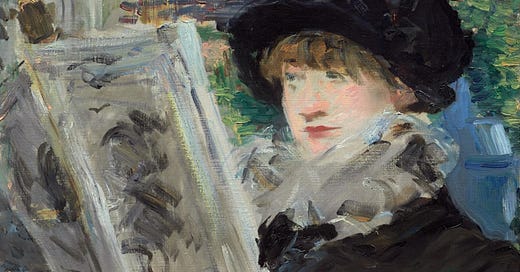



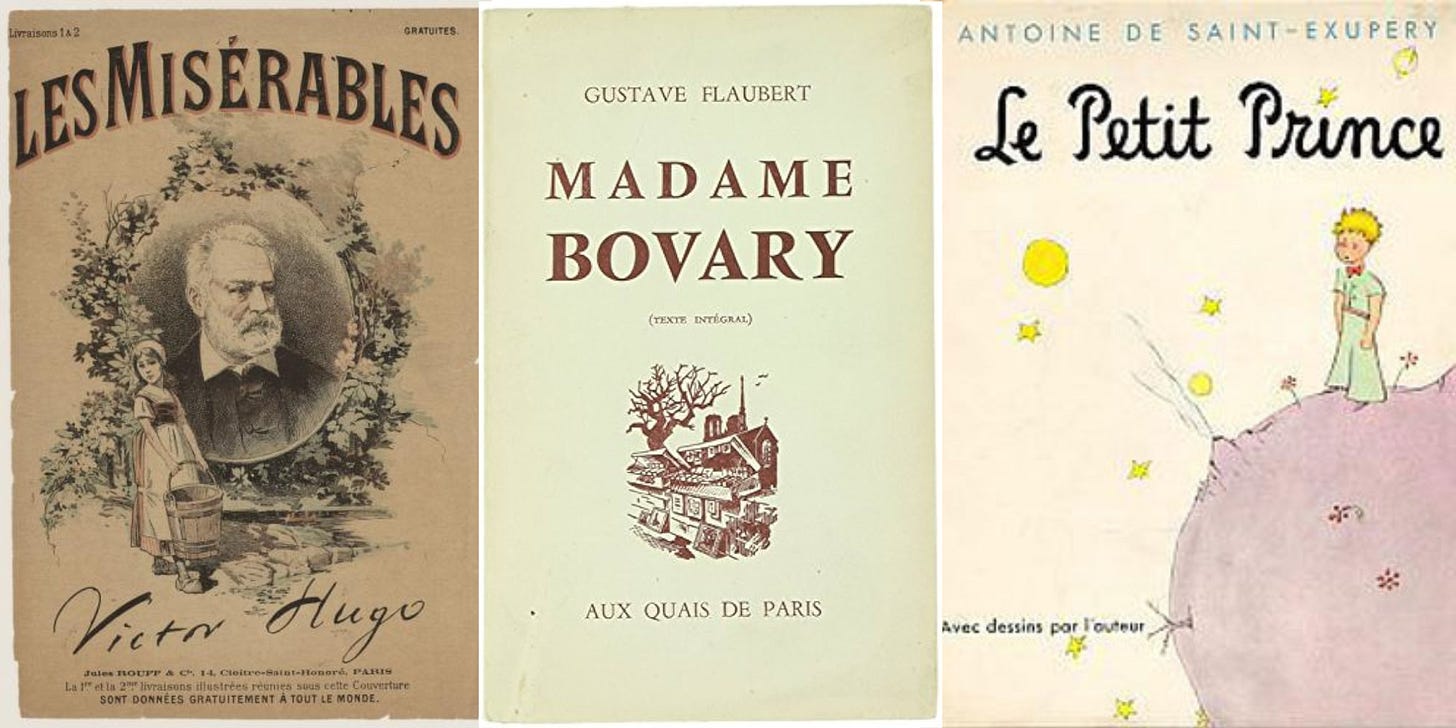


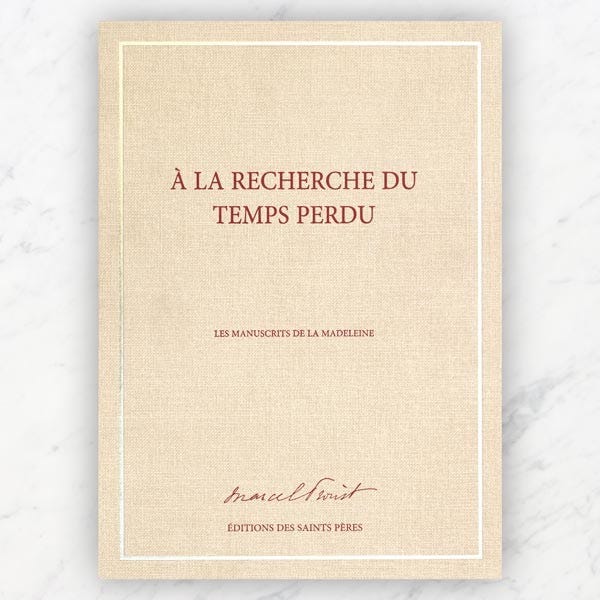
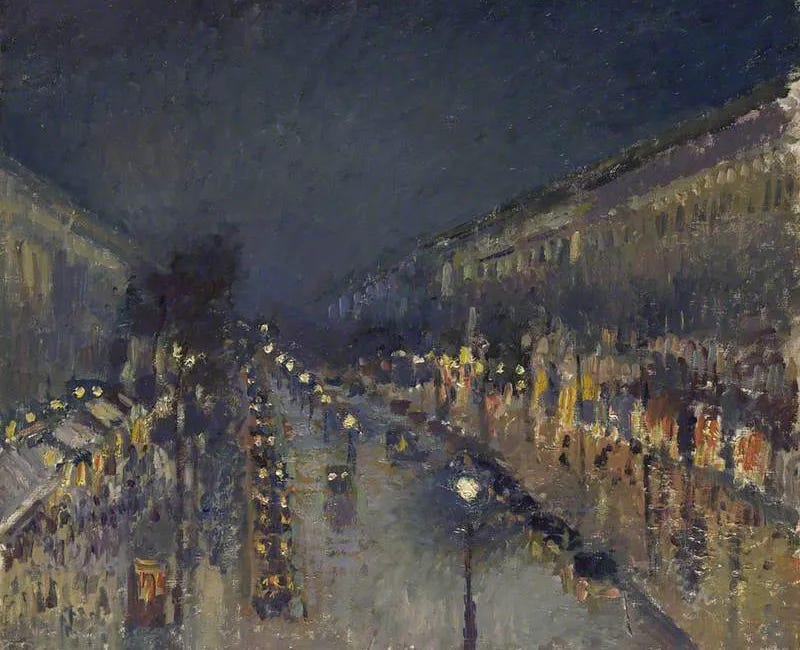
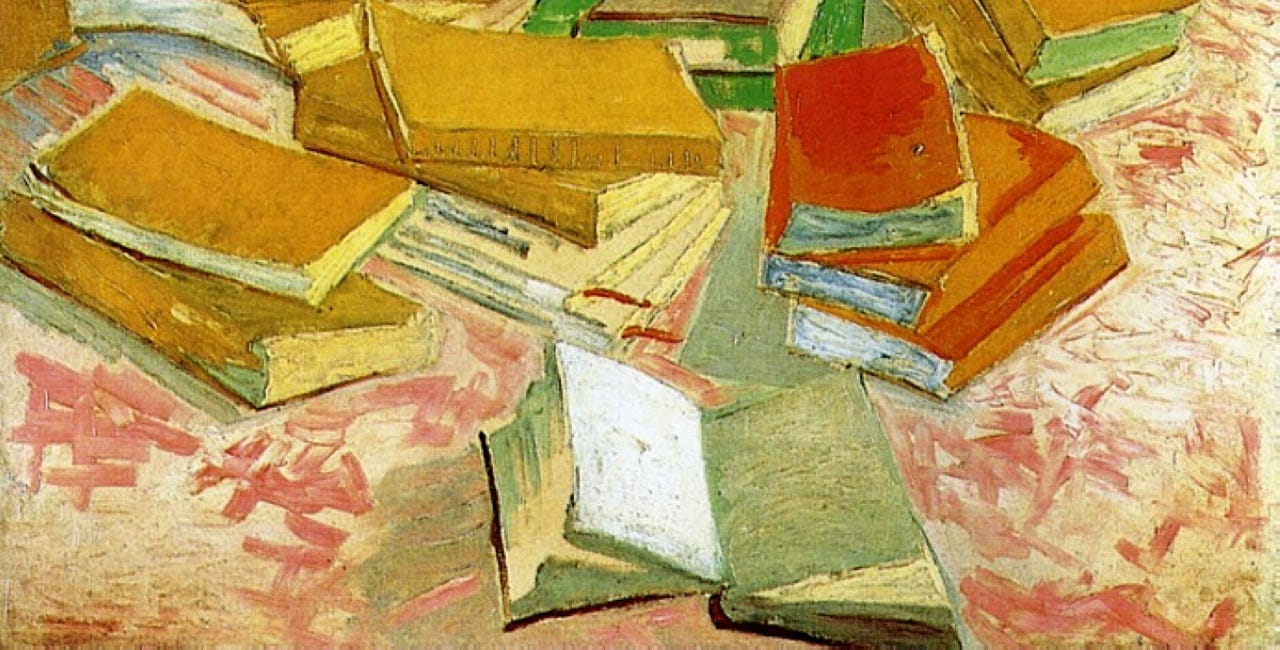
Les misérables is just far, far too long - and I say that as someone who genuinely loves most long nineteenth century novels. It feels like the author was just padding it out with as much description as possible, and that’s because Hugo was paid to write 10 instalments. (The same is true of Le comte de Monte Cristo and many Dickens novels: too much padding.) I would kick it way down the rankings. On the other hand, Germinal and Le Rouge et le Noir deserve to be at the top. You could never accuse Zola or Stendhal of padding out their novels unnecessarily. (And why not La Chartreuse de Parme, too?) I have a particular love for Les liaisons dangéreuses and would also move it several places up the rankings. It’s all killer no filler, and I don’t think it’s actually any more difficult to understand than Hugo or Zola. Simone de Beauvoir and Colette surely deserve to be on your list too? I come back to Colette again and again.
Merci beaucoup pour cette liste. C'est vrai que j'ai lu, ou que j'aurais dû lire, tous ces livres pendant mes études universitaires. Mais j'étudiais la littérature anglaise et les mathématiques en même temps, et je travaillais, donc quand je les ai lus, je les ai lus trop vite, à toute vitesse.
Votre liste m'a donné envie de les redécouvrir, mais je vais commencer par ceux que je n'ai pas encore lus. J'aimerais commencer par « La Nuit des temps ».
Et il y en a certains que j'ai beaucoup aimés : « Le Petit Prince », « L'Étranger » et « Madame Bovary ».
Merci encore !